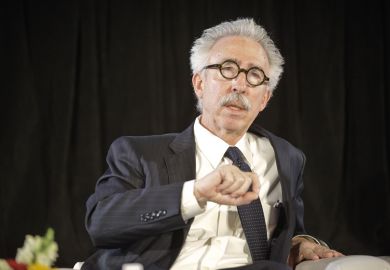Many US university presidents believe that their state political climate is “hostile” towards higher education, according to a survey conducted by the American Council on Education.
A survey of 1,546 US university leaders found that 41 per cent of respondents perceived their political climate to be hostile. Presidents of public universities were more likely to give this response (45 per cent) than their private college counterparts (36 per cent).
Slightly more than half (52 per cent) of private university presidents and slightly less than half (48 per cent) of public university presidents thought that their state political climate was supportive.
The findings were published in the 2017 edition of the American College President Study, which is released every five years. It was based on a survey carried out in 2016.
According to data published last year by the Center on Budget and Policy Priorities, a US thinktank, 46 states in America spent less per student on higher education during the 2015-16 academic year than they did before the global recession. The average state spent 18 per cent less per student, it claimed.
In the ACE survey, more than two-fifths (41 per cent) of presidents said they expected state funding as a proportion of total revenue to decline over the next five years, while just 14 per cent said they thought that it would increase and 29 per cent predicted that it would stay the same.
Leaders of doctorate-granting universities were the only cohort based on type of institution to be more likely to describe their state political climate as hostile (47 per cent) than as supportive (46 per cent).
Jonathan Gagliardi, associate director of ACE’s Center for Policy, Research and Strategy and lead author of the report, said this might be because doctorate-granting universities are “contingent on state support in a variety of different forms”.
In addition to general appropriations, they receive money for research and community development from states, he said. He added that the perceived hostility among presidents in general is likely to be related to the “long term decline in state funding for colleges and universities” over the past 25 years.
Meanwhile, 28 per cent of respondents expected federal funding to drop in the next five years, while 42 per cent thought that it would stay the same.
Terry Hartle, ACE’s senior vice-president in the division of government and public affairs, said that concerns about funding “predate” Donald Trump’s presidency but have been “exacerbated” by his proposals to “reduce federal domestic spending by a substantial amount of money".
Earlier this year, Mr Trump proposed that funding for the National Institutes of Health would decline by 18 per cent, for example, although the US Congress later announced a 6 per cent budget increase for the government agency.
In the survey, university leaders said that they expected other areas of fundraising to grow in importance. An overwhelming majority predicted that private gifts, grants and contracts (85 per cent), tuition fees (75 per cent) and endowment income (64 per cent) will increase over the next five years.
When asked to select which areas occupy most of their time, almost two-thirds (65 per cent) of presidents said budget or financial management, an increase of seven percentage points since 2011, while over half (58 per cent) said fundraising, up from 47 per cent five years ago.
Enrolment management and governing board relations also now take up an increasing amount of presidents’ time, chosen by 32 per cent and 33 per cent of respondents respectively, compared with just 20 per cent and 21 per cent respectively in 2011.
Register to continue
Why register?
- Registration is free and only takes a moment
- Once registered, you can read 3 articles a month
- Sign up for our newsletter
Subscribe
Or subscribe for unlimited access to:
- Unlimited access to news, views, insights & reviews
- Digital editions
- Digital access to THE’s university and college rankings analysis
Already registered or a current subscriber?








